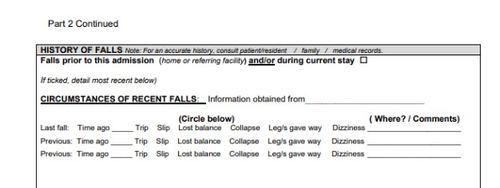Our Dementia Fall Risk Ideas
Our Dementia Fall Risk Ideas
Blog Article
The Basic Principles Of Dementia Fall Risk
Table of ContentsExamine This Report on Dementia Fall RiskNot known Factual Statements About Dementia Fall Risk Excitement About Dementia Fall RiskDementia Fall Risk Can Be Fun For AnyoneExamine This Report on Dementia Fall Risk
In the area, poor road illumination or unprotected creeks and garbage dumps might likewise create mishaps. Falls Risk Analysis Device (FRAT) is a 4-item falls-risk screening device for sub-acute and property care. The FRAT has 3 sections: drop danger status, danger variable checklist, and action strategy. A Loss Risk Standing includes information concerning history of recent falls, drugs, mental and cognitive standing of the person.If the patient scores on a threat factor, the equivalent number of factors are counted to the individual's fall danger score in the box to the much. If a patient's autumn risk rating amounts to 5 or higher, the person is at high danger for falls. If the individual scores only four factors or lower, they are still at some threat of dropping, and the nurse ought to use their ideal clinical assessment to manage all fall danger aspects as part of a holistic treatment strategy.
These basic approaches, in general, aid establish a secure atmosphere that reduces unintended falls and marks core preventative procedures for all patients. Signs are important for individuals at risk for falls.
Things about Dementia Fall Risk
As an example, wristbands must consist of the individual's last and given name, date of birth, and NHS number in the UK. Information need to be printed/written in black against a white background. Only red color ought to be utilized to signify special client condition. These suggestions are consistent with present advancements in patient identification (Sevdalis et al., 2009).
Items that are too far might need the patient to connect or ambulate needlessly and can potentially be a risk or add to falls. Helps stop the individual from heading out of bed with no support. Registered nurses respond to fallers' telephone call lights faster than they do to lights initiated by non-fallers.
Aesthetic disability can considerably trigger falls. Hip pads, when worn correctly, might reduce a hip fracture when autumn takes place. Keeping the beds closer to the floor reduces the risk of falls and major injury. Placing the mattress on the flooring substantially reduces fall threat in some medical care setups. Reduced beds are created to lessen the range an individual drops after relocating out of bed.
The Main Principles Of Dementia Fall Risk
Individuals that are high and with weak leg muscle mass who try to rest on the bed from a standing setting are most likely to fall onto the bed due to the fact that it's also low for them to lower themselves securely. If a high individual attempts to obtain up from a reduced bed without aid, the person is likely to fall back down onto the bed or miss out on the bed and drop onto the flooring.
They're developed to advertise prompt rescue, not to stop drops from bed. Aside from bed alarms, increased supervision for high-risk patients also might aid avoid falls.

People with visit the site a shuffling gait increase fall chances considerably. To reduce fall risk, footwear need to be with a little to no heel, thin soles with slip-resistant walk, and support the ankle joints. Encourage client to utilize nonskid socks to avoid the feet from gliding upon standing. Motivate people to put on proper, well-fitting shoesnot nonskid socks for motion.
The Facts About Dementia Fall Risk Revealed
People, especially older grownups, have minimized visual capacity. Lighting an unfamiliar environment helps boost visibility if the patient must obtain up during the night. In a study, homes with appropriate lights report less falls (Ramulu et al., 2021). Improvement in lighting in your home might decrease autumn prices in older adults (Dementia Fall Risk). Making use of gait belts by all health and wellness treatment suppliers can promote safety and security when assisting clients with transfers from bed to chair.

Sitters work for assuring a secure, secured, and risk-free setting. However, research studies demonstrated extremely low-certainty evidence that sitters minimize loss risk in acute treatment medical facilities and only moderate-certainty that alternatives like video tracking can lower caretaker use without boosting fall threat, recommending that sitters are not as helpful as at first thought (Greely et al., 2020).
The Facts About Dementia Fall Risk Revealed

Enhanced physical fitness minimizes the danger for falls and limits injury that is suffered when loss takes place. Land and water-based exercise programs might be likewise valuable on balance and stride and consequently decrease the danger for falls. Water exercise may add a positive advantage on equilibrium and gait for women 65 years and older.
Chair Increase Exercise is a straightforward sit-to-stand exercise that aids strengthen the muscular tissues in the thighs and butts and boosts wheelchair and independence. The goal is to do Chair Increase exercises without utilizing hands as the customer ends up being more powerful. See resources section for a detailed direction on just how to carry out Chair Surge exercise.
Report this page